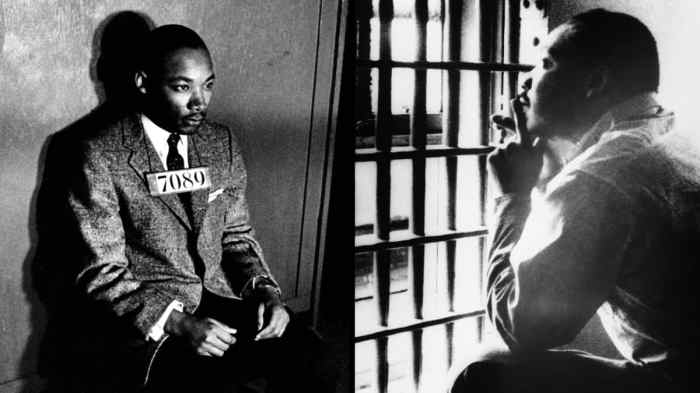Diction in letter from birmingham jail – In Martin Luther King Jr.’s seminal work, “Letter from Birmingham Jail,” diction plays a pivotal role in conveying the author’s arguments, establishing his credibility, and evoking an emotional response from his audience. This essay will delve into the nuanced use of language in the letter, examining its significance in shaping the author’s message and its enduring impact on the Civil Rights Movement.
King’s mastery of diction is evident from the outset, as he employs formal and elevated language to establish his authority and credibility. The use of legal and theological terminology lends weight to his arguments, while biblical and historical allusions resonate with his audience’s values and beliefs, effectively connecting with their emotions and intellect.
Diction in the Letter’s Opening: Diction In Letter From Birmingham Jail

The opening paragraphs of the letter employ formal diction, characterized by elevated and sophisticated language. This formality establishes the author’s credibility and authority as a respected intellectual and religious leader. The use of legal and theological language, such as “conscience,” “justice,” and “divine law,” further reinforces his position as a knowledgeable and authoritative voice.
Diction of Biblical and Historical Allusions
The letter is replete with biblical and historical allusions that enhance the author’s arguments and appeal to the audience’s emotions. Biblical references, such as the parable of the Good Samaritan and the teachings of Jesus, evoke a sense of morality and ethical responsibility.
Historical allusions, such as the American Revolution and the Declaration of Independence, draw parallels between the author’s struggle for justice and the nation’s fight for freedom.
Diction of Emotional Appeal
The author employs emotive language to convey his personal experiences and feelings, establishing a deep connection with the audience. Through vivid descriptions and heartfelt anecdotes, he paints a vivid picture of the injustices and suffering endured by the African American community.
This emotional appeal resonates with readers, compelling them to empathize with the author’s cause.
Diction of Rhetorical Devices, Diction in letter from birmingham jail
The letter is characterized by the skillful use of rhetorical devices, such as metaphors, similes, and analogies. These devices enhance the author’s arguments by making them more vivid, memorable, and persuasive. For example, the comparison of racial injustice to a “stumbling block” vividly illustrates the obstacles faced by African Americans in their pursuit of equality.
Diction of Racial Injustice
The author employs strong and direct language to expose the racial injustice and discrimination prevalent during the time the letter was written. He uses terms such as “segregation,” “discrimination,” and “brutality” to convey the urgency and gravity of the situation.
This stark and unyielding diction serves to shock and galvanize the audience, highlighting the need for immediate action.
Diction of Social Responsibility
The author emphasizes the moral and ethical obligations of individuals and society as a whole through the use of powerful language. He urges readers to recognize their responsibility to fight against injustice and to create a more just and equitable society.
This diction inspires a sense of urgency and encourages readers to take action, recognizing the profound impact their choices can have on the world.
Questions and Answers
What is the significance of the formal diction used in the opening paragraphs of the letter?
The formal diction establishes King’s credibility and authority, conveying a sense of seriousness and gravitas to his arguments.
How do biblical and historical allusions contribute to King’s arguments?
Biblical and historical allusions resonate with the audience’s values and beliefs, appealing to their emotions and intellect and strengthening the impact of King’s arguments.
What is the role of emotive language in the letter?
Emotive language allows King to convey his personal experiences and feelings, connecting with the audience on an emotional level and persuading them of his views.


